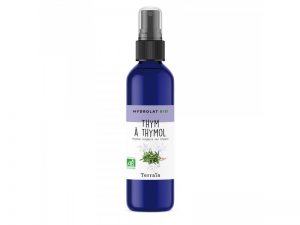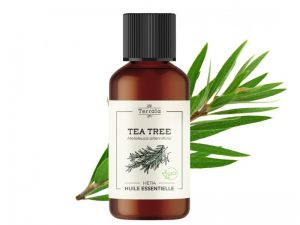For almost half a year now I have a cute little blue bottle of Thymus Vulgaris in my fridge and I have no clue what to do with it. I’m usually very inventive when it comes to creating meals but I don’t even know if I can eat that thing? Sure, it comes from a plant (actually, it’s very pure plant wise) but I heard that essential oils can be dangerous under certain circumstances. So what’s a new naturopath to do? The nature of the product is hydrosole (of Thyme) which is a fancy word for spray. I also have a few little bottles of essential oils which I also don’t know what to do with them. I received them when I had a health issue which went away pretty fast so now I’m left with Aromatherapy… Left-Overs.
Recycling # 1 with Thyme Hydrosol
Already I had to learn about what makes a hydrosol. Is it an essential oil, a floral compound, aromatherapy water? Is it dangerous for health and if so, what do I do with it in my fridge? I put it there because it was written on the bottle that it was best to keep it that way.
When we look a little more on the internet, we find that to make 1 liter of hydrosol, 1 kilo of aerial parts is necessary, we are talking about
1/1 ratio. We also learn that hydrosols are products sensitive to pollution. This is why they must be put in the fridge and used within 6 months of opening. I must be approaching the deadline, that’s why I’m actively researching what to do with my hydrosol.
It seems that one of the characteristics of thyme hydrosol is to calm insect bites. This is interesting. I had to buy myself a cream to fulfill this function: one less purchase to make, therefore. But can we put it like that on the skin, without having to mix it with oil, like essential oils? It seems so! A little bit of spray on the bite, and you’re done! The kids will love it. What else?
Other Advantage of Thyme Hydrosol
I am talking about thyme in this article because it is indeed the one that I have in my possession and that I must recycle soon. There are still a few mosquitoes but I will have to find another use for this hydrosol. It seems that it also helps with yeasts and fungi. As I wrote more than a year ago on this blog (in English, I don’t know why), my foot fungus problem is one of the most difficult that I have encountered in my life. This is also why I wrote a second article on the subject. You can’t complain when it comes to your worst health problem! I didn’t know about the thyme hydrosol option (and I explored options!), So I’ll get down to business as soon as possible. As the director of the CMDQ said: “you are not born a naturopath, you become one through experience!”
You can also add it to spinach soup for more flavor, but this one the kids aren’t going to like too much.
Recycling # 2 with lemon essential oil
This one was not too difficult. I quickly learned that it can be used to clean certain surfaces, giving them a good smell. And in addition it disinfects! So I put a few drops once a week in soap and water when cleaning my floors. Also, in the bathroom, it is a very natural way to give a good smell to surfaces. It smells clean!
Recycling # 3 with Tea Tree Oil

For this Tea Tree essential oil, I found several applications other than the original one. In the first place, I use it to cure a case of periodontics: a drop on my toothbrush (with the toothpaste) is supposed to improve the situation at the level of the gums. Second, I remove moths from clothes with a drop on a cotton pad in the cupboards. All this is of course at the discovery stage and I do not have a sure and scientific result for all these tests. It would be a question of finding solid scientific studies on the subject, but it is still to be looked into. In the meantime, we are doing with trial and errors. Anyway, these beautiful bottles must be used for something 🙂
If you enjoyed this article, maybe you’ll also like:
Ravintsara: Indispensible Essential Oil for the Winter
How I Dealt with my Being Overweight




Leave a Reply